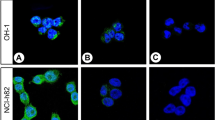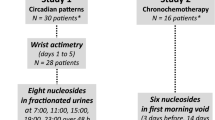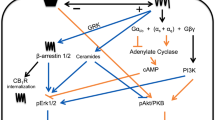Abstract
The influence of some biogenic amines and amine-receptor-blocking drugs in the growth rate of human colorectal carcinomas propagated as s.c. xenografts in immune-deprived mice was studied. In mice treated with adrenaline, a beta-adrenergic agonist, the growth of xenografts was suppressed for 2 days, after which growth was resumed at a rate similar to that in control animals. Treatment with the phosphodiesterase inhibitor theophylline prolonged the adrenaline-induced inhibition of growth. Treatment with the beta-adrenergic antagonist sotalol or practolol increased the rate of tumour growth. Treatment with either serotonin or the histamine H2-receptor agonist Dimiprit had no effect on tumour growth rate. However, the antiserotoninergic drug BW 501C and the histamine H2-receptor antagonist cimetidine each caused short-term suppression of tumour growth.
This is a preview of subscription content, access via your institution
Access options
Subscribe to this journal
Receive 24 print issues and online access
$259.00 per year
only $10.79 per issue
Buy this article
- Purchase on Springer Link
- Instant access to full article PDF
Prices may be subject to local taxes which are calculated during checkout
Similar content being viewed by others
Rights and permissions
About this article
Cite this article
Tutton, P., Steel, G. Influence of biogenic amines on the growth of xenografted human colorectal carcinomas. Br J Cancer 40, 743–749 (1979). https://doi.org/10.1038/bjc.1979.255
Issue Date:
DOI: https://doi.org/10.1038/bjc.1979.255
This article is cited by
-
Effects of histamine, H2, H2 and Hic receptor antagonists andα-fluoromethylhistidine on the growth of human colorectal cancer in the subrenal capsule assay
Agents and Actions (1994)
-
Amine dependence of proliferative activity in two transplantable lines of mouse colonic carcinoma
Virchows Archiv B Cell Pathology Including Molecular Pathology (1987)



